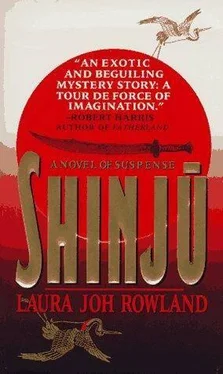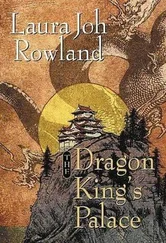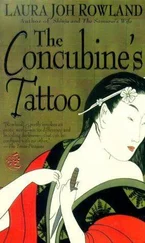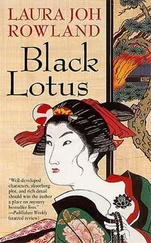Laura Rowland - Shinjū
Здесь есть возможность читать онлайн «Laura Rowland - Shinjū» весь текст электронной книги совершенно бесплатно (целиком полную версию без сокращений). В некоторых случаях можно слушать аудио, скачать через торрент в формате fb2 и присутствует краткое содержание. Жанр: Исторический детектив, на английском языке. Описание произведения, (предисловие) а так же отзывы посетителей доступны на портале библиотеки ЛибКат.
- Название:Shinjū
- Автор:
- Жанр:
- Год:неизвестен
- ISBN:нет данных
- Рейтинг книги:4 / 5. Голосов: 1
-
Избранное:Добавить в избранное
- Отзывы:
-
Ваша оценка:
- 80
- 1
- 2
- 3
- 4
- 5
Shinjū: краткое содержание, описание и аннотация
Предлагаем к чтению аннотацию, описание, краткое содержание или предисловие (зависит от того, что написал сам автор книги «Shinjū»). Если вы не нашли необходимую информацию о книге — напишите в комментариях, мы постараемся отыскать её.
Shinjū — читать онлайн бесплатно полную книгу (весь текст) целиком
Ниже представлен текст книги, разбитый по страницам. Система сохранения места последней прочитанной страницы, позволяет с удобством читать онлайн бесплатно книгу «Shinjū», без необходимости каждый раз заново искать на чём Вы остановились. Поставьте закладку, и сможете в любой момент перейти на страницу, на которой закончили чтение.
Интервал:
Закладка:
With difficulty, he maneuvered the horse through the crowd and resumed his search. Having read an illustrated version of The Tale of Genji , he had an idea of how the shogun would look tonight. The women of that period four hundred years past had worn layers of sashless kimonos-five or six, each a different color, with flowing skirts that dragged on the ground and sleeves that covered their hands. They’d worn their hair long and loose and parted in the middle. But where was the shogun? What was he doing?
Sano tried to put himself in Tokugawa Tsunayoshi’s position. As a man eager to shed the burdens of power and fame for one night, where would he go? The elaborate costume suggested that he wanted to mingle with the revelers in the streets and teahouses, protected from enemies or supplicants by a disguise not as easily penetrated as a simple mask. He could be anywhere, although he wouldn’t have come alone. He’d have brought bodyguards with him, possibly dressed in costumes of the same period. With that little to go on, Sano fought his way down the street. He only hoped Lord Niu had no more information about the shogun’s plans than he did.
Where were Lord Niu and the other conspirators? In their place, Sano would ambush Tsunayoshi outside the quarter for a quick, neat kill away from all the confusion, and an easy getaway. Yet he dared not try to predict the mad Lord Niu’s actions. Neither did he have any idea what disguises the conspirators might be wearing.
Realizing he couldn’t cover the whole quarter with any speed, Sano began stopping people he met. He shouted, “Have you seen- ” and then described the shogun’s party the way he imagined it. The answers he got were varied-”
“No. Yes. Maybe. I don’t know!” from a drunken merchant.
“Don’t be so serious. Come have a drink!” from some rowdy young samurai.
– and largely useless.
Then a pleasure house doorman said, “An old-fashioned lady, you say? Why are you looking for her, when there are so many pretty modern girls here?”
The mention of girls and the sight of the parading yūjo reminded Sano of Wisteria. She’d helped him once; maybe she would again. She must have many friends in Yoshiwara who could join in the search, and enough samurai admirers to stand against Lord Niu’s men. He started toward the Garden of the Heavenly Palace. Then he spotted another procession of yūjo gathered outside a teahouse. Joy and concern flooded him in equal measures as his gaze found the woman at the end.
Except for her distinctive round eyes, he wouldn’t have recognized Wisteria. Much thinner and paler, she wore a plain cotton kimono. Beside her swayed a very drunk man. As Sano watched, he flung an arm around Wisteria, hand groping for her breast. Wisteria’s face was frozen in a grimace that barely resembled a smile.
Sano had no time to wonder what had caused the high-ranking beauty to sink to such depths. “Lady Wisteria!” he called. Somehow he reached her side without trampling anyone. He called her name again.
“Wisteria!” he shouted, lifting his mask for a moment so she could see his face. “Wisteria, do you remember me?”
Her false smile vanished. “You!” she shouted, eyes ablaze with hatred. “I helped you. I gave myself to you. And look what’s become of me!”
Her angry gesture encompassed her drab, haggard appearance, her oafish customer, her place at the end of the line. Sano’s heart contracted. He had, he recalled now, reported their conversation to Magistrate Ogyu. Ogyu must have ordered her demoted to low-class prostitute and social nonentity so that no one would pay attention to any stories she might tell about Noriyoshi’s murder. Another life ruined by his actions. But he couldn’t let guilt or pity stop him from doing what he must.
“Lady Wisteria, forgive me. I need your help again. I have to find-”
“Stay away from me!” she shrilled. “You’ve done enough harm already!”
Shaking free of her customer, she turned and fled. Her small size let her squeeze through narrow openings in the crowd as Sano could not. He had no choice but to let her go.
He turned away hastily when he saw another doshin pushing through the crowd toward him. He dismounted and continued down the street, leading the horse. From ground level, he could no longer look down over the crowds, but his new vantage point hid him from his pursuers and let him peer into doorways and open windows. In the teahouses and restaurants he saw many tall, heavy women that had to be men in disguise, but no one matching the shogun’s description.
He rounded a corner into a street barely wide enough for four men to walk side by side. The quarter’s outer wall blocked its far end. Brilliant lanterns, strung across the street between the roofs of the houses, danced overhead. The dense crowd brought Sano to an abrupt halt. He stood on his toes and craned his neck. All around him, men celebrated with increasing abandon as the festivities neared their peak. Caged yūjo cried out encouragements and invitations. The ground under Sano’s feet was slippery with sour-smelling mud. Then he saw a sleek dark head that reached above the others, about thirty paces away. A momentary gap in the crowd gave him a glimpse of a large, homely white face and long, flowing hair. The man-woman smiled and waved to someone. His billowy gold sleeve fell back to reveal layered kimonos underneath: red, green, blue, white.
At the same time as Sano recognized Tokugawa Tsunayoshi, the crowd pressed against him. Three samurai, masked but in ordinary clothes, were moving his way, clearing a path ahead of the shogun. Six more bodyguards, three mounted and three on foot, covered their master’s back and sides. Sano pushed at the bodies that stood between him and the middle of the street. He had to intercept the shogun before he disappeared into the crowd.
“Stop pushing!” someone yelled, shoving Sano back against a railing.
“Out of the way, out of the way,” called the shogun’s bodyguards.
Sano knotted his horse’s reins around the railing. Then he wedged himself between two men. The first bodyguard neared him. An elbow knocked his mask askew, and as he righted it, he saw the bodyguard pause and turn his head in response to a call.
A doshin appeared beside the guard. They began a conversation that the other two front-runners joined, shouting in one another’s ears because of the crowd noise. Sano couldn’t hear what they were saying, but he could guess. The doshin was asking or telling them about a certain dangerous fugitive.
Sano continued to work his way forward. At whatever risk to himself, he must use this opportunity to warn the shogun. The Conspiracy of Twenty-One might make their move at any instant.
Just then, a distant boom sounded. A hush fell over the crowd; men paused in the act of speaking, drinking, dancing, walking. Heads lifted in listening anticipation, among them those of the shogun and his party. Another boom followed, then another. Suddenly the night came alive with the clamor of a million gongs and bells, some high-pitched and sweet, others deep and sonorous. A cheer swept the quarter. It was midnight, and the priests in temples all over Edo had begun to exorcise the evil of the Old Year and ring in the good of the New. The peals and booms echoed off the distant hills and rocked the ground. The very air shuddered.
Sano listened with the rest of the crowd, momentarily spellbound as they were by the awe-inspiring music. Then, on the high right edge of his field of vision, he saw a movement. He turned.
A samurai dressed in dark robes, leggings, and mask crept along a roof. As Sano watched, the man knelt and took an arrow from the quiver that hung from his shoulder. He fitted the arrow to his bow and drew back on the string, aiming straight at the shogun.
Читать дальшеИнтервал:
Закладка:
Похожие книги на «Shinjū»
Представляем Вашему вниманию похожие книги на «Shinjū» списком для выбора. Мы отобрали схожую по названию и смыслу литературу в надежде предоставить читателям больше вариантов отыскать новые, интересные, ещё непрочитанные произведения.
Обсуждение, отзывы о книге «Shinjū» и просто собственные мнения читателей. Оставьте ваши комментарии, напишите, что Вы думаете о произведении, его смысле или главных героях. Укажите что конкретно понравилось, а что нет, и почему Вы так считаете.












